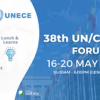News
Displaying Results 51 - 75 of 117
World trade continues to be severely affected by global supply chain disruptions, exacerbated by shocks including the ongoing Covid-19 pandemic and the war in Ukraine. These challenges attest to the value of supporting and reinforcing trade facilitation measures to enhance resilience in all regions…
The United Nations Framework Classification for Resources (UNFC) is now published in Greek and Portuguese. These translations will support policymakers to implement enhanced sustainable resource management in the UNECE region.
A universally acceptable and internationally applicable scheme for the…
As the sun sets in northern México, less than 100 kilometres from its border with the United States, news from the latest coal mining disaster near Sabinas, in the state of Coahuila, is heartbreaking for the families awaiting at the surface. Military divers who have bravely attempted to make their…
In 2022, international cooperation in energy and critical raw materials is high on the agenda. Optimal use of critical raw materials, for which demand is set to continue rising, will be crucial in delivering the green transition in energy, mobility and the digital world.
This will be in the…
In the past few years, multiple shocks ranging from pandemics to conflicts have restricted the movement of goods and services, resulting in the number of countries facing significant disruptions in supply chains is increasing every year, affecting timely delivery of essential goods, such as food…
In June 2022, the World Trade Organization (WTO) Members agreed on the Ministerial Outcome Document, which marked for the first time the recognition of the importance of the multilateral trading system in addressing the triple global environmental crises of climate change and related natural…
With blockchain opening up many avenues in international trade – from facilitating financing and customs procedures to tracking due diligence and sustainability compliance – countries and companies are looking for successful practices to scale up their efforts to maximize the potential of this new…
July is a month to start enjoying the harvest of fruits and vegetables for many in Europe and the topic of reducing food loss and waste becomes very urgent. In Serbia, agriculture is an important sector of the economy, contributing around 6% of GDP. In March 2022 food production accounted for 10.4…
In view of the upcoming COP 27 of the UNFCCC, taking place in Egypt later this year, the growing threats on climate created by the textile and leather sectors call for our urgent action. If we continue down this path, we will fail by 50% to meet our 2030 emissions reduction targets, resulting in…
The UNECE region is not on track to meet the Sustainable Development Goals (SDGs) by 2030. Public procurement can be a powerful policy lever to accelerate progress. Some Governments in the UNECE region spend as much as 20 percent of GDP annually on procuring goods, services, and infrastructure.…
The third online meeting on the new Master Plan for Kharkiv on 28 May 2022 saw a group of local architects join the discussions led by the Norman Foster Foundation and the City Government of Kharkiv. Mayor of Kharkiv Ihor Terekhov spoke of his vision to transform the city to become a great…
UNECE was engaged at the main global forum to assess and discuss progress in implementing the Sendai Framework for Disaster Risk Reduction (DRR) – the seventh session of the Global Platform for Disaster Risk Reduction (GP2022) held in Bali and online, 25-27 May 2022, fully embracing its theme: “…
Public-Private Partnerships (PPPs) have become one of the preferred mechanisms for financing the Sustainable Development Goals (SDGs) in many countries in the UNECE region. Through its approach to PPPs for the SDGs, UNECE supports countries identifying, developing and implementing infrastructure…
Products today are integrating more and more advanced technologies and sustainability criteria into their design. Soft toys with computer chips, medical devices that can assist in operations and learn from past uses, repurposed plastic bottles assembled to form a new, different product… each pose…
Standards are an integral part of society and are present in nearly everything that surrounds us on a daily basis; they shape how products are designed, produced and used. They are in all products that cross borders and can play a key role to reduce technical barriers to trade as well as integrate…
Embracing sustainable infrastructure that is green, circular, inclusive, resilient, fiscally sustainable, and of high quality is crucial for meeting the Sustainable Development Goals (SDGs). Public-Private Partnerships (PPP) can promote the development of such infrastructure projects by putting…
Recent disruptions of supply chains have exposed fragilities in the current trading system and brought to light the importance of resilience and transparency in global trade.
UNECE and other international organizations play a crucial role in supporting countries (including both the public and…
As an established convenor of standards developing organisations, UNECE encourages the integration of a gender perspective, providing practical steps for organisations to advance women’s full and effective participation in standards and standards development. With the objective of strengthening…
The textile industry is a key driver of Uzbekistan’s economy, reflected in the country’s rank as sixth largest cotton producer in the world. In 2021, the country accelerated the battle against its child and forced labor violations in cotton harvest according to a new International Labour…
New multilateralism, focused on creating synergies between local, national, regional and global efforts, combined with practical, forward-looking solutions are needed to address the pressing challenges facing cities across the globe, including the coronavirus pandemic, rapid urbanization, and…
Infrastructure investment is long-term in nature and can lay the foundations for sustainable development in member States. To improve the sustainability of infrastructure and public services, such investments must be aligned with the Sustainable Development Goals (SDGs) says the United Nations…
As supply chains within the garment and footwear sector are becoming increasingly complex, the need for transparency is more relevant than ever. Consumers, investors and shareholders are pressing for transparent business activities as well as the prevention and mitigation of risks in value chains,…
There is overwhelming evidence that we need robust management and traceability for the sustainable and circular supply and use of climate-critical raw materials. Calls are increasing for the production of raw materials to embrace circularity. Demand for batteries and other low carbon technologies…
Global trade has been transformed repeatedly throughout history, driven by new business processes and new policies. The new advances in digitalization now promise further transformation by making it faster, more transparent, reducing risks of red tape and corruption. With the increase in global…
Over 60 participants worldwide joined the online roundtable organized by the UN Digital transformation group for Europe and Central Asia (DTG4ECA) in the framework of the Regional Forum on Sustainable Development for the UNECE region. Established in May 2020, DTG4ECA group, co-chaired by UNECE and…


























